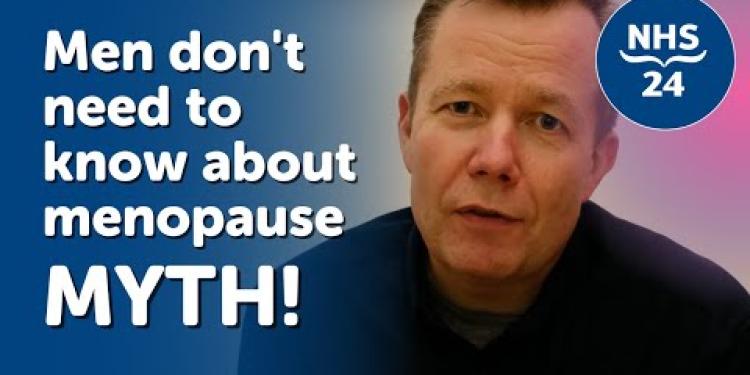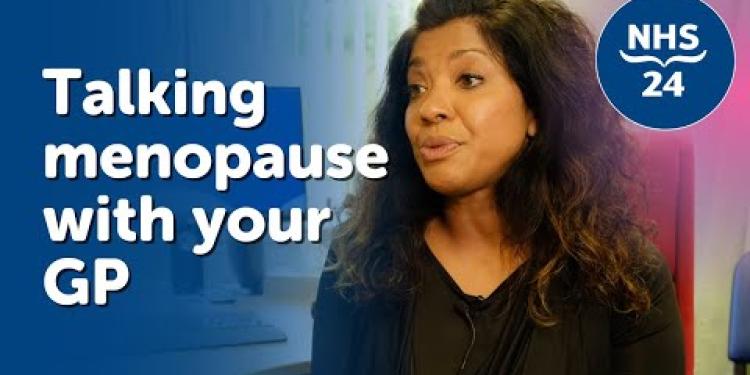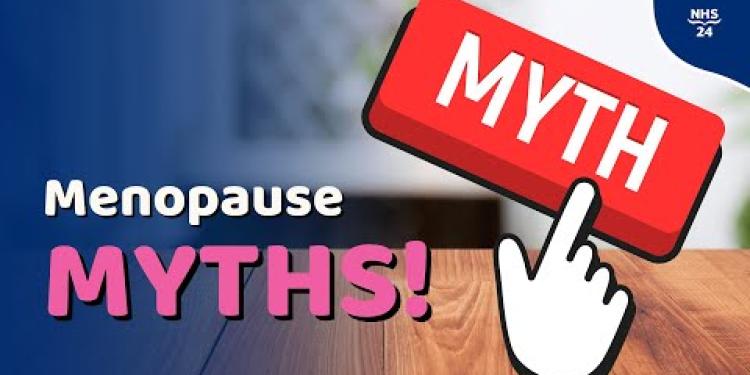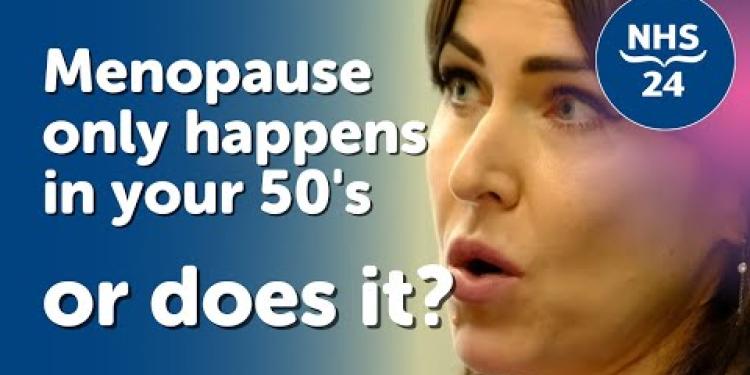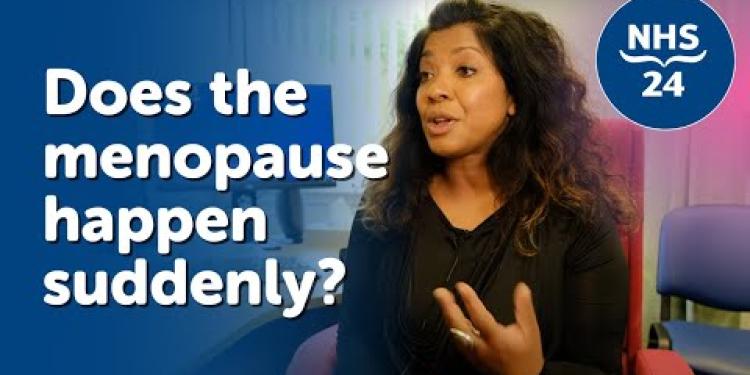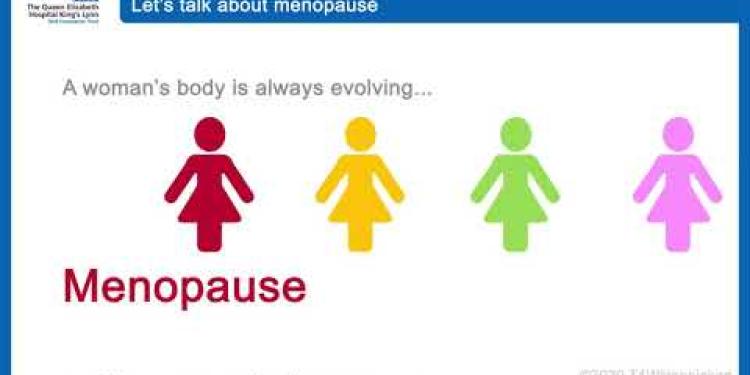Important Information On Using This Service
- Ergsy carefully checks the information in the videos we provide here.
- Videos shown by YouTube after a video has completed have NOT been reviewed by ERGSY.
- To view, click the arrow in the center of the video.
Using Subtitles and Closed Captions
- Most of the videos you find here will have subtitles and/or closed captions available.
- You may need to turn these on and choose your preferred language.
Turn Captions On or Off
- Go to the video you'd like to watch.
- If closed captions (CC) are available, settings will be visible on the bottom right of the video player.
- To turn on captions, click settings.
- To turn off captions, click settings again.
Find A Professional
Living with the Menopause
Understanding Menopause
Menopause is a natural part of ageing for women, usually occurring between 45 and 55 years of age. In the United Kingdom, the average age for menopause is 51. Menopause marks the end of menstrual cycles and fertility, characterized by a significant decrease in estrogen and progesterone production by the ovaries. Symptoms can vary but commonly include hot flashes, night sweats, mood swings, and sleep disturbances.Managing Symptoms
Managing menopause symptoms can be challenging but there are several strategies that can help. Hormone Replacement Therapy (HRT) is commonly prescribed to alleviate severe symptoms by balancing hormone levels. For those seeking alternatives, lifestyle changes like regular exercise, a balanced diet, and stress management techniques such as yoga and mindfulness can be beneficial. Over-the-counter treatments, including herbal supplements like black cohosh and soy isoflavones, can also offer relief.Health Considerations
During menopause, women often face increased health risks, including osteoporosis and cardiovascular disease. It is crucial to maintain a healthy lifestyle and have regular check-ups with a GP. Calcium and vitamin D supplements, along with weight-bearing exercises, can strengthen bones. Monitoring blood pressure, cholesterol levels, and maintaining a healthy weight are essential for heart health.Emotional Well-being
Emotional and psychological well-being is equally important during menopause. Mood swings, anxiety, and depression can be common. Engaging in open conversations with family, friends, or joining support groups can provide emotional support. Professional counseling or therapy might be beneficial for those struggling with mental health issues. Practicing self-care by engaging in hobbies, meditation, or simply setting aside time for oneself can improve overall quality of life.Accessing Support in the UK
In the UK, a variety of resources are available for women going through menopause. The NHS provides information and support, including access to HRT and specialist referrals. Charities like Menopause Matters, The British Menopause Society, and various online forums serve as valuable sources of support and information. It’s crucial to utilize these resources to navigate this life stage with confidence and resilience.Understanding, managing, and seeking support for menopause can make this transition smoother and enhance overall well-being.
Living with the Menopause
Understanding Menopause
Menopause is when a woman stops having periods. It usually happens between the ages of 45 and 55. In the UK, most women experience menopause at around age 51. This change happens because the body makes less of the hormones estrogen and progesterone. Common signs of menopause are feeling hot suddenly (hot flashes), sweating at night, mood changes, and trouble sleeping.Managing Symptoms
Dealing with menopause can be tough, but there are ways to feel better. Doctors might suggest Hormone Replacement Therapy (HRT) to help with bad symptoms. Other ways to feel better are exercising regularly, eating healthy food, and doing things like yoga or meditation to manage stress. Some people find relief with herbal supplements like black cohosh and soy, which you can buy at the store.Health Considerations
During menopause, women need to be careful about their health. There is a higher risk of weak bones and heart problems. It is important to live healthily and see a doctor regularly. Taking calcium and vitamin D can help keep bones strong. Exercise that includes lifting weights is also good for the bones. Keep an eye on blood pressure and cholesterol, and try to stay at a healthy weight to protect your heart.Emotional Well-being
Feeling good emotionally is just as important during menopause. It’s common to feel up and down, anxious, or sad. Talking with family and friends or joining a support group can help. Seeing a counselor or therapist can also be good for mental health. Doing things you enjoy, like hobbies or meditation, and making time for yourself can make life better.Accessing Support in the UK
In the UK, there are many resources for women going through menopause. The NHS offers help and information, including HRT and referrals to specialists. Charities like Menopause Matters and The British Menopause Society, as well as online forums, provide valuable support. It's important to use these resources to feel confident and strong during this time.Learning about menopause, managing symptoms, and finding support can make this change easier and help you feel better overall.
Frequently Asked Questions
What is the menopause?
The menopause is a natural part of aging for women, typically occurring between 45 and 55 years of age. It is marked by the end of menstrual periods and signifies the end of a woman's reproductive years.
What are the common symptoms of menopause?
Common symptoms include hot flushes, night sweats, mood swings, vaginal dryness, and disrupted sleep. Symptoms can vary in severity and duration for different women.
At what age do most women in the UK enter menopause?
Most women in the UK enter menopause between the ages of 45 and 55, with the average age being around 51.
How long do menopause symptoms last?
Menopause symptoms can last for several years. For some women, symptoms last around 4 years, while others may experience symptoms for over a decade.
What is perimenopause?
Perimenopause is the transition period leading up to menopause when a woman's hormone levels start to change. Symptoms can begin several years before menopause and continue until the ovaries stop releasing eggs.
Can menopause be treated?
While menopause is a natural process that doesn't require treatment, its symptoms can be managed through lifestyle changes, hormone replacement therapy (HRT), and other medications. Consult your GP for advice on managing menopause symptoms.
What is Hormone Replacement Therapy (HRT)?
HRT is a treatment used to relieve menopausal symptoms by replacing hormones that are at a lower level during menopause. It can come in the form of tablets, skin patches, gels, and implants.
Are there any risks associated with HRT?
HRT can have some risks, including a slight increase in the risk of breast cancer and blood clots. However, these risks are small and should be weighed against the benefits. Consult your GP to discuss your individual risks and benefits.
What lifestyle changes can help manage menopause symptoms?
Lifestyle changes such as maintaining a healthy diet, regular physical exercise, quitting smoking, and reducing alcohol intake can help improve menopausal symptoms. Stress management techniques like yoga and mindfulness can also be beneficial.
Is it normal to experience mood swings during menopause?
Yes, mood swings are common during menopause due to hormonal changes. If mood swings are severe, it is advisable to speak with a healthcare provider for support and potential treatments.
Can menopause affect sexual health?
Menopause can affect sexual health, including reduced libido and vaginal dryness, which can cause discomfort during sex. Lubricants and moisturizers, as well as HRT, can help alleviate these symptoms.
What role does diet play in managing menopause symptoms?
A balanced diet rich in fruits, vegetables, whole grains, and lean protein can help manage menopause symptoms. Foods high in calcium and vitamin D are particularly important for bone health during menopause.
Can exercise help with menopause symptoms?
Regular exercise can help alleviate menopausal symptoms such as hot flushes, mood swings, and sleep problems. It also promotes overall health, aiding in the prevention of weight gain and osteoporosis.
What are natural or alternative treatments for menopause symptoms?
Some women find relief from menopause symptoms through alternative treatments such as herbal supplements (e.g., black cohosh, evening primrose oil), acupuncture, and mindfulness. It's important to discuss these with a healthcare provider to ensure they're safe and effective.
When should I see a doctor about menopause symptoms?
You should consult a doctor if you're experiencing severe symptoms that affect your quality of life, if you have menopausal symptoms before the age of 45, or if symptoms continue well beyond the average menopausal age. A healthcare provider can offer guidance and treatment options.
What is the menopause?
The menopause is when a woman's body stops having periods. This usually happens between the ages of 45 and 55. The body makes less of some hormones. This can cause changes and some symptoms.
- Periods stop.
- Mood can change.
- Body might feel hot.
If you have trouble understanding menopause, you can:
- Ask a doctor or nurse.
- Read books for kids about bodies.
- Use apps that explain health in a simple way.
Menopause is something that happens to all women as they get older. It usually happens when women are between 45 and 55 years old. Menopause is when women stop having their periods. It means they can't have babies anymore.
What happens during menopause?
During menopause, people can feel different. Here are some things they might notice:
- Hot flashes: Feeling really hot suddenly.
- Night sweats: Sweating a lot at night.
- Trouble sleeping: Finding it hard to sleep.
- Mood changes: Feeling happy, sad, or grumpy quickly.
- Tiredness: Feeling very tired.
- Dry skin: Skin feeling drier than normal.
If someone is having a tough time, they can talk to a doctor or a nurse. Reading books or taking notes can help understand more. Using apps to track symptoms might be useful too.
Some things you might feel are hot flashes, sweating at night, changes in mood, dry feeling in the vagina, and trouble sleeping. These feelings can be different for each woman. They might be really strong or not too bad, and they might last for a short time or a long time.
How old are most women in the UK when they start menopause?
Most women in the UK start menopause around age 51. Menopause is when women stop having their monthly periods.
Some tools and tips to help understand this:
- Talk with a doctor or nurse.
- Use simple books or videos about menopause.
- Ask questions if something is unclear.
Most women in the UK go through menopause when they are between 45 and 55 years old. The average age for this is about 51.
How long do menopause symptoms last?
Menopause is when a woman's body changes and she stops having periods. This can cause symptoms like hot flashes or feeling moody.
These symptoms can last for a different amount of time for each person. Some feel them for a few months, but others might feel them for a few years.
If you are having trouble, talk to a doctor. They can help and give advice.
Using a calendar to track when symptoms happen can also be helpful.
When a woman goes through menopause, she can feel symptoms for a long time. Some women feel these symptoms for about 4 years. Other women might feel them for more than 10 years.
What is perimenopause?
Perimenopause is the time before menopause. It is when a woman's body starts changing. Her periods may be different. They might be shorter, longer, or stop for a while.
A woman might feel warm all of a sudden. This is called a hot flash. She might feel sad or grumpy more often.
If you want to know more or need help, talking to a doctor is a good idea.
Perimenopause is the time before menopause. A woman's body starts to change because of hormones. These changes can start a few years before menopause and go on until the ovaries stop releasing eggs.
Can menopause be treated?
Menopause is when a woman's periods stop. It can cause hot flashes and mood changes. Yes, doctors can help. They can give medicine to make you feel better. Talking to someone or using a fan for hot flashes can also help. It's good to speak to a doctor or nurse. They can give advice on what works best for you.Menopause is a normal part of life, and it doesn't need treatment. But, if it makes you feel uncomfortable, there are ways to help. You can change some of your daily habits, take special medicines like hormone replacement therapy (HRT), or try other medicines. It's a good idea to talk to your doctor. They can help you with menopause symptoms.
What is Hormone Replacement Therapy (HRT)?
Hormone Replacement Therapy, or HRT, is medicine that some people take to feel better. It helps when their bodies do not make enough hormones.
Hormones are chemicals inside us. They help control how we feel and how our body works. Sometimes people's bodies need more of these chemicals as they get older.
If you want to know more, talking to a doctor can help. They can explain how HRT works for you. Picture books or videos about HRT can also be helpful.
HRT is a treatment that helps with problems women have during menopause. It gives back hormones that drop when menopause happens. You can take it as pills, skin patches, gels, or implants.
If reading is hard, try using a ruler or your finger to follow the words. You can also read out loud or listen to audiobooks to make it easier.
Is HRT safe?
There are some risks with HRT, which is short for Hormone Replacement Therapy. It's important to talk to a doctor about it.
You might have questions like:
- Can it make me sick?
- Are there side effects?
Doctors can help answer these questions. They can give advice that is right for you.
Helpful tips:
- Write down questions before visiting the doctor.
- Bring a friend or family member to help you remember the information.
HRT can have some risks. These include a small chance of getting breast cancer and blood clots. But these risks are very low. It's important to think about the good things HRT can do for you, too. Talk to your doctor about what is best for you.
How can you feel better during menopause?
There are some simple things you can do to feel better during menopause. These changes can help with tiredness, hot flashes, and mood.
- Eat healthy food: Try to eat more fruits, vegetables, and whole grains.
- Exercise regularly: Walking, swimming, or dancing can be good for you.
- Get enough sleep: Try to go to bed and wake up at the same time every day.
- Stay cool: Wear light clothes and keep your room cool to help with hot flashes.
- Talk to someone: Sharing how you feel with someone you trust can be helpful.
Using a calendar to track your symptoms or setting reminders can also support you. Remember, everyone is different, so find what works best for you. Talking to a doctor or nurse can give you more ideas and support.
There are things you can do to feel better during menopause. Eating healthy food and exercising help a lot. Try not to smoke and drink less alcohol.
It is also good to feel calm. You can try doing yoga or learning to be mindful. These can help you feel less stressed.
Is it normal to have changes in feelings during menopause?
Yes, feeling moody is normal when going through menopause. This happens because the hormones in the body are changing. If you're feeling very moody, it is a good idea to talk to a doctor. They can help and may suggest things that could make you feel better.
Does menopause change how you feel about sex?
Menopause can change how you feel about sex. You might not want sex as much, and it can make your vagina dry. This might make sex hurt.
Using special gels or creams can help. These are called lubricants and moisturizers. Going to see a doctor might help too. They might talk about something called HRT that can make you feel better.
How can food help with menopause symptoms?
Eating the right foods can help women feel better during menopause.
Here are some tips:
- Eat lots of fruits and vegetables. They are good for your body.
- Choose foods with calcium and vitamin D for strong bones. Milk, cheese, and leafy greens are good choices.
- Drink plenty of water to stay hydrated.
- Avoid too much sugar and spicy foods. They might make symptoms worse.
If you find it hard to read or understand this, you can ask someone to read it with you. You can also use tools like audiobooks to listen to the information.
Eating the right foods can help feel better during menopause. Try eating lots of fruits and vegetables. Whole grains like brown rice or whole wheat bread are good too. Lean protein, like chicken or fish, is helpful.
It is also important to eat foods with lots of calcium and vitamin D. These help keep your bones strong during menopause.
Can exercise help with menopause symptoms?
Menopause is when a woman's body changes and her periods stop. This can cause some uncomfortable feelings like hot flashes and mood swings.
Exercise means moving your body, like walking, dancing, or playing sports. Exercise can help you feel better during menopause.
Exercise can make your body stronger and help you sleep better. It can also make you feel happier and less stressed.
If you want to exercise, start with easy activities, like walking or stretching. Try to move a little bit every day.
You can ask a doctor or a friend for help with exercise. You can also watch videos or use apps that show you how to exercise.
Doing exercise can help with problems during menopause like feeling very hot, changes in mood, and trouble sleeping. Exercise is also good for keeping the body healthy. It helps stop weight gain and keeps bones strong.
- Try simple exercises like walking or dancing.
- Join a class or group for support.
- Use videos or apps to help you exercise at home.
- Ask a friend to exercise with you.
What are natural or alternative treatments for menopause symptoms?
Menopause is a time when a woman's body changes. It can cause hot flashes, trouble sleeping, and mood changes. Some people want to try natural ways to feel better. Here are some ideas:
- Try herbs like black cohosh and red clover. They might help with hot flashes.
- Exercise regularly to feel better and sleep better.
- Eat healthy foods, like fruits and vegetables.
- Practice relaxation techniques like yoga or deep breathing.
Before trying new treatments, talk to a doctor or nurse. They can help you choose what's safe and best for you.
Some women feel better from menopause symptoms by trying different treatments.
These can be:
- Herbal supplements like black cohosh and evening primrose oil.
- Acupuncture, which is using small needles to help feel better.
- Mindfulness, which is being calm and focusing on the present moment.
It's really important to talk to a doctor before trying these to make sure they are safe and will work.
When should I see a doctor about changes during menopause?
Menopause is when a woman stops having periods. It happens naturally. But sometimes, it can make you feel unwell. Here’s when you should talk to a doctor:
- If you feel very sad or worried.
- If you have trouble sleeping.
- If your heart beats very fast.
- If your body feels hotter or you sweat a lot, even when it's cool.
- If you have pain or discomfort in your body.
Always tell a doctor about any changes that bother you. Reading with a family member or friend can help. You can also use text-to-speech tools to hear the information. Don't be afraid to ask for help to understand better.
See a doctor if you have bad symptoms that make life hard, if you have menopause symptoms before age 45, or if these symptoms last a long time. A doctor can help and tell you about treatments.
Useful Links
Useful links from: Men Don't Need to Know about Menopause | NHS 24
- NHS - Menopause Overview Comprehensive guide from the NHS covering what menopause is, symptoms, treatments, and advice on managing this stage of life.
- NHS 24 - Menopause Information from NHS 24 about menopause, including symptoms, causes, diagnosis, and support options available in Scotland.
- Menopause Matters A resource supported by healthcare professionals providing information, advice, and support on all aspects of the menopause.
- British Menopause Society The British Menopause Society provides education, information and guidance to healthcare professionals and women on the menopause.
Useful links from: Talking menopause with your GP
- NHS - Menopause Comprehensive information on menopause, including symptoms, treatments, and advice on talking to your GP about your experience.
- NHS - Menopause: Talking to Your Doctor Guidance on how to discuss menopause symptoms with your GP, including what to expect and questions to ask.
- The Menopause Charity Offers support and resources including advice on how to have conversations about menopause with your healthcare provider.
- Women's Health Concern Fact sheets and guidance on menopause, with tips on preparing for a GP appointment and managing symptoms.
Useful links from: Menopause Myths
- NHS - Menopause NHS page on menopause providing reliable information on symptoms, treatments, and common myths.
- Women's Health Concern - Menopause Myths Women's Health Concern provides a factsheet dispelling common myths about menopause.
- Menopause Matters - Myths Menopause Matters is a UK charity offering detailed information and debunking myths related to menopause.
- The Daisy Network - Menopause Myths The Daisy Network is a UK charity that supports women with POI and provides resources on menopause myths.
Useful links from: Does Menopause Only Happen in Your 50's? | NHS 24
- NHS - Menopause NHS guidance on menopause, including symptoms, treatments, and advice on managing menopause. Comprehensive resource for women going through menopause, commonly in their 40s or 50s.
- NHS Inform - Menopause Information from NHS Scotland on menopause, detailing what to expect and how to manage symptoms. Provides context on the typical age range for menopause and potential early onset.
- Women's Health Concern UK charity Women's Health Concern offers advice and support on menopause, including factsheets with detailed information on symptoms, treatment options, and lifestyle tips.
- Menopause Matters A leading menopause website in the UK providing an array of information regarding menopause, early menopause, and associated conditions. Offers resources for both women and healthcare professionals.
Useful links from: Let's Talk About Menopause - The Queen Elizabeth Hospital King's Lynn NHS Foundation Trust
- NHS - Menopause Comprehensive information on menopause, including symptoms, treatments, and advice on managing the transition.
- Menopause Matters A leading UK charity providing up-to-date information about the menopause, menopausal symptoms, and treatment options.
- Women's Health Concern The patient arm of the British Menopause Society, offering detailed factsheets and advice on various aspects of the menopause.
- The Daisy Network A support group for women who have been diagnosed with premature menopause, providing resources and a community for those affected.
More Videos of Interestdiagnosis
Have you found an error, or do you have a link or some information you would like to share? Please let us know using the form below.
- Ergsy carfully checks the information in the videos we provide here.
- Videos shown by Youtube after a video has completed, have NOT been reviewed by ERGSY.
- To view, click the arrow in centre of video.
- Most of the videos you find here will have subtitles and/or closed captions available.
- You may need to turn these on, and choose your preferred language.
- Go to the video you'd like to watch.
- If closed captions (CC) are available, settings will be visible on the bottom right of the video player.
- To turn on Captions, click settings .
- To turn off Captions, click settings again.
